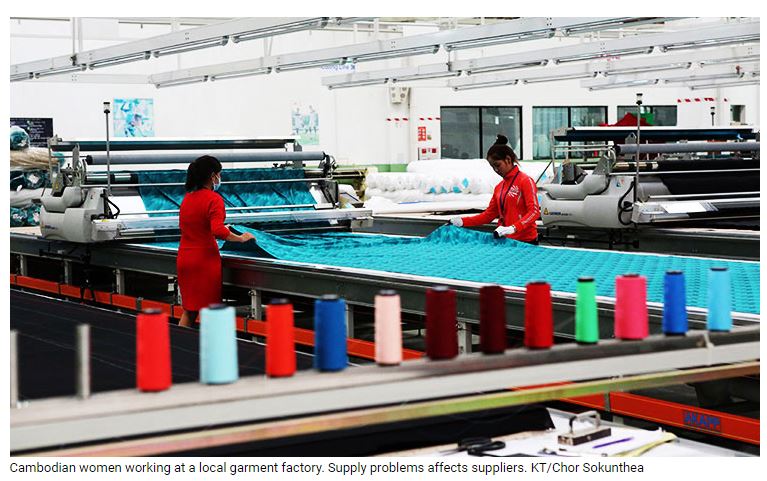Cambodia faces supply chain crunch, no thanks to COVID-19
Southeast Asian suppliers from Cambodia, Myanmar and Vietnam have become increasingly important to global fashion brands. Nearly 20% of Uniqlo owner Fast Retailing’s disclosed core sewing factories are in Vietnam, though China is still home to about half.
However, these suppliers now face a supply chain issue as most materials for the end product comes from China which has been wrecked with restarting of its manufacturing and production machinery as a result of the COVID-19.
These garment makers, however, still depend on Asia’s biggest economy for raw material, come from China and transport and supply chain disruptions in that country are spilling over into Southeast Asia.
Ken Loo, secretary general of the Garment Manufacturers Association in Cambodia, was quoted by Nikkei Asian Review that more than 60% of raw material for the country’s apparel industry came from China.
Suspensions or shutdowns of factories are “something that’s on the horizon,” he said.
Even though more than half of raw material factories in China have resumed production, Loo explained, it will take time for them to get back up to full speed, and that is only one hurdle.
“With the controls that the Chinese government has put in place, it’s extremely difficult for not [in terms of] movement of goods, but the movement of personnel across provincial lines or sometimes even across townships.”
Alternative sourcing, Loo added, was not a practical solution.
Heng Sour, a Labor Ministry spokesman, told local media outlet the Khmer Times last week that 90,000 workers at more than 200 factories would be suspended if new supplies do not arrive in March.
Uniqlo, meanwhile, has already announced on its Japanese website that “there are delays in production and logistics due to the novel coronavirus.” The company has delayed the launch of some products, including the Uniqlo U jacket for the Spring-Summer collection, which was supposed to go on sale from Friday. Its release has now been pushed back to early March.
“If there are additional delays in reopening [Chinese factories], there could be further impact,” a spokesperson for Uniqlo owner Fast Retailing said, adding that the company is “closely monitoring” the situation.
A garment industry insider in Cambodia, meanwhile, predicts the epidemic will do far more than create temporary shortages.
“As companies increasingly look at supply chain efficiency in this time of tariffs, EBA and reduction emissions, the impact of the virus will likely have a legacy on how companies source in the future,” the source said, referring to the EU’s Everything But Arms trade scheme. “Having yarn/fabric/product finishing all done domestically will reduce future risks to global supply of materials. Nikkei Asian Review
Textile production is more capital intensive than sewing, and China remains dominant in material production even as brands diversify their manufacturing bases.
“While Vietnam can produce textiles itself and can maintain certain production levels, the impact may be bigger in countries such as Cambodia that are more dependent on Chinese production of textiles,” the source familiar with Uniqlo said.
He added that customs clearance is delayed, while factories in China are operating at a reduced rate due to staff shortages caused by restrictions on movement of people imposed by the Chinese government.
Concerns are already running high in Cambodia.
Source: https://www.khmertimeskh.com/50694492/cambodia-faces-supply-chain-crunch-no-thanks-to-covid-19


 English
English




